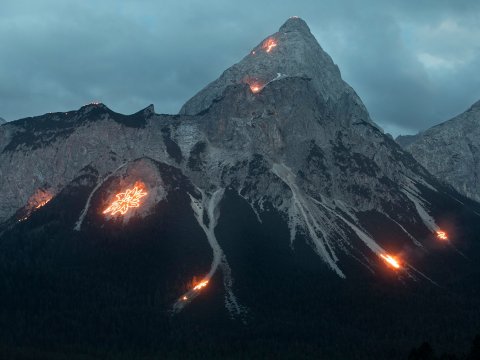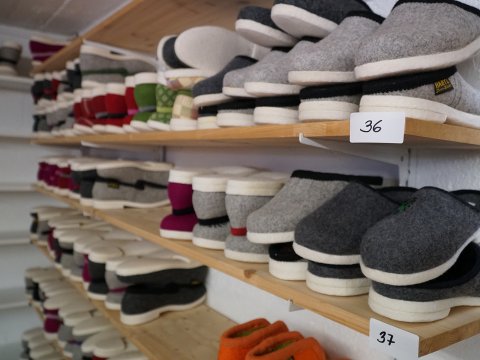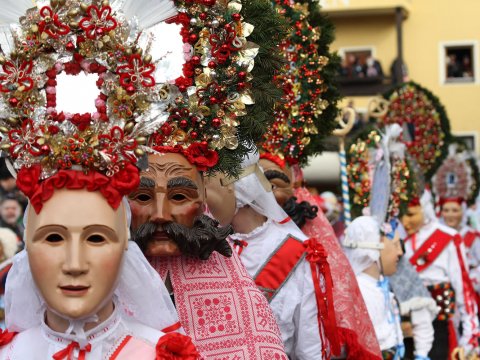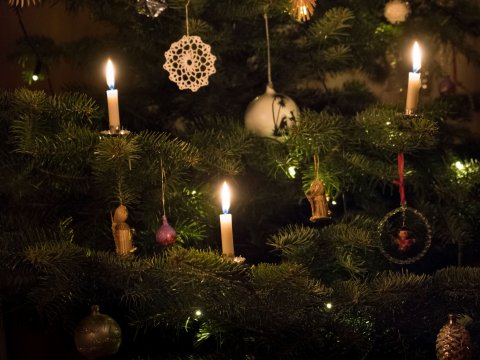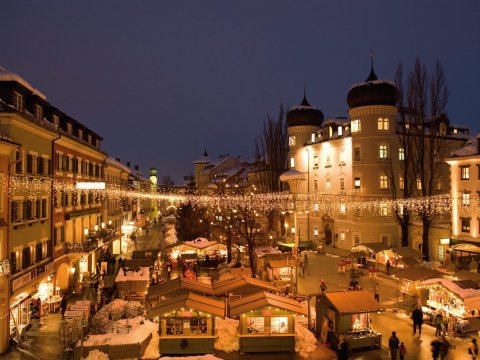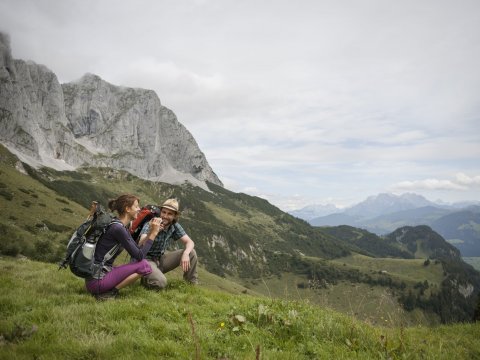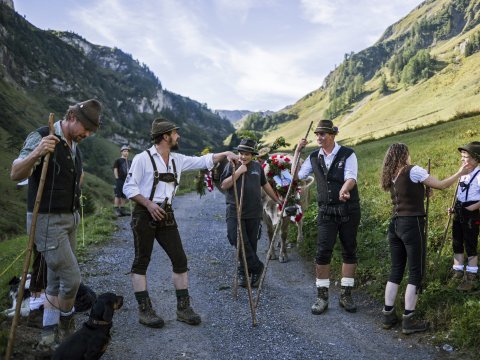Black and White
Photos: Verena Kathrein
Chimney sweeps are symbols of good luck in the German-speaking world. As such they can often be found (albeit in miniature form) on wedding cakes, in children's books and as talismans for the New Year. Yet they also still exist in real life, where they perform a dirty and often dangerous job. We joined two of them for a day of work in one of Tirol's most beautiful valleys.



The Leite, a collection of farmsteads in Obernberg, are one of the highest places on Simon Henökl's regular round. These buildings on a steep, winding mountain road are perched at 1,500 metres above sea level. As we meet up it is 8 o'clock in the morning. A strong wind is blowing from the forests. Snow is in the air. At our first port of call, the Staudhof, the ladder is ready and waiting. "People know we're coming," says Henökl. The 24-year-old chimney sweep is accompanied by his apprentice Elisa Pöltl. Both carefully climb up and trudge through the snow to the top of the roof, step by step. They both know that in conditions like these the roofs could be icy and slippery. They also have to watch out for power lines, which in some cases have no insulation and therefore provide the serious risk of an electric shock. Finally, they both make it to the top. Two black figures surrounded by lots of white snow. They plunge their brushes into the chimneys. As Simon lowers the nylon rope, he tells me that "soot particles can make it hard for the smoke to escape and eand up catching fire". That is why it is important to clean chimneys on a regular basis. He lowers the rope, pulls it up. Again and again, further and further, until the chimney has been cleaned from top to bottom. As he does so, Simon lets his gaze wander into the distance. On the horizon we can see some of the most famous mountains in Tirol, from the Olperer in the east to the Sattelberg, the Kreuzjoch and the Grubenjoch across to the Tribulaun Massif bordering Italy. Each peak stands like a freshly fluffed pillow in the winter landscape.


"I love the mountains," says Simon with a smile on his face. I can tell straight away that Simon Henökl also loves his job. He is the fourth fourth generation of his family to work as a chimney sweep. As well as brushes and poles, a cheery nature and friendly smile are also part of his toolkit. "It's important that people can trust us," he says. After all, a chimney sweep doesn't just to go on the roof but also into the kitchen, the boiler room and the dining room. Family photos, travel souvenirs, traditional carved Jesus figures – during his work he gets to see some of the most intimate items of a family home.
It's important that people trust us.
In most houses, the chimney sweep and his apprentice first clean the wood-burning stove and pipes, then the wood gasifier in the basement, which is used to produce hot water. "Up here, most people still burn wood to heat their homes," says Simon."Many of the farmers have their own forests. You can see that from the piles of wood in front of the farms. While chimney sweeps working in the city nowadays mainly monitor systems, take measurements and give advice on energy efficiency and environmental protection, Simon and his colleagues still get their hands and faces dirty practising a trade dating back many centuries. Wood-fired heating systems simply produce more residue than oil or gas – and this residue has to be removed regularly. But there are also other reasons why the chimney sweep comes round more often here in the mountains than elsewhere."People who live in high and cold regions simply use the heating more and for longer periods than those who live in warmer environments."

Heating through the summer
Almost all of Simon Henökl's customers live at over 1,000 metres above sea level. In the higher reaches of the Wipptal Valley, many homes need heating throughout the summer months too. After all, snow can fall here in June or even July. No wonder Simon has to visit most of his customers four times a year. Indeed, such frequent checks are required by law to minimise the risk of fire.

Then he and Elisa sweep the ash out of the cracks, scrape the chimneys clean and brush the black residue out of the steel containers. As he does so, Simon also checks that all the elements of the heating system are in good working order. Apprentice Elisa listens carefully as he explains the details of the various systems. There are several models, and they all have to be maintained and cleaned differently. It is hard physical work. "Our work can be very hard," says Simon: "Particularly on the knees." Yet this doesn't dampen his enthusiasm for the trade, and Elisa isn't complaining either. "Everyone always asks me if this work isn't too hard for a girl," she says and laughs: "But it's just right for me."
I like my job. We spend a lot of time outdoors and meet lots of different people.

The two of them carry out their tasks with calm and composure. It's not always easy. After all, Simon and Elisa have to work in all conditions including rain, snow and wind. Scrambling around on snow-covered roofs is not without its dangers, yet even in stressful situations they manage to treat each other with respect and humour."The job is very varied," says Elisa. "We spend a lot of time outdoors and meet lots of different people."
A job that used to be even tougher
Simon and Elisa are welcome visitors. "I'm always happy when they come," says Erika Widmann. The 83-year-old already knew Simon's grandfather. She has seen many chimney sweeps come, sweep and go. "Simon's uncle would sometimes sit under a tree with a book instead of working," she remembers with a smile. In earlier times, the farmer's wife says, the chimney sweeps used to come to the valley by bus or on foot. "The road wasn't built until 1964." They then spent a week travelling round the houses and farms, often sleeping in barns. That was a time when you still had to crawl through narrow chimneys to clean them from the bottom up. "I'm not sure whether I would have been able to cope with that," says Simon.

Soon the fire is crackling in Erika Widmann's freshly cleaned hearth. "Now it's warm again," she says happily. "People can't live without warmth. Especially not up here." Time for lunch. Together with two other chimny sweeps and Simon's father, Konrad, they stop off at the Alte Post guesthouse in Gries.The landlady gives the soot-smeared chimney sweeps newspaper to sit on. But it's not just the workmen's clothes that are dirty – their hands are too. "If we tried to brush it off every time," says Simon, "we'd ruin our skin."They only scrub off the soot in the shower at the end of the day. At lunchtime, chimney sweeps eat with black fingers. After a hearty lunch of Schnitzel and Schlutzkrapfen there's just time for an espresso before it's time to head off to the next job.


Advice on environmental protection
From farm to farm, from house to house they go. Sometimes the two chimney sweeps scramble onto newly built roofs, sometimes onto centuries-old ones. Sometimes the sun is shining, sometimes there is a flurry of snow. In some houses Elisa and Simon squeeze through narrow hatches, in others they climb over a parapet onto the roof. At each and every place they always descend into the boiler rooms, kneeling next to ski boots, logs of wood and plastic buckets. They shine their magnetic torches inside the chimney shafts and boilers. The sound of the vacuum cleaner can be heard all day.The ash which is hoovered up by the duo is later scattered outside. "It's good fertiliser," explains Simon: "Organic fertiliser".

Simon knows his stuff. After all, he also trained as an environmental and energy consultant. As well as cleaning the chimney he can also tell his customers the best way to heat their home, why a wood chip heating system becomes a mini power station in a region where almost everyone has wood, and why oil heating systems are by law no longer allowed to be installed in new buildings in Tirol."For us chimney sweeps," says Simon, "ecological aspects have become increasingly important." After all, his job is not just about safety, but also about energy efficiency and environmental sustainability. Fine dust particles are much less important here in alpine valleys than in towns and cities, and it would be far too expensive to lay gas pipes here, so traditional heating using wood method is set to continue for many years to come.
At the end of the working day, with the snow falling outside, Simon and Elisa knock on the door of the Michlerhof. This farmstead is over 500 years old. Its owner, 89 year-old Alfred Larcher, comes to the door wearing a felt hat, a thick beard and blue jeans. While the chimney sweeps get to work in his kitchen, he slices cheese and bacon and fetches a two-litre bottle of lemonade from the pantry. "Sit down," says the farmer and is delighted that Simon's father turns up later. Tthey talk and laugh a lot. Chimney sweeping is not just an trade, it seems, but a way of life. No matter how busy they are, Simon and Elisa always find a little time to sit down and chat. Just like Simon's father and grandfather. Some things, it seem, never change.










